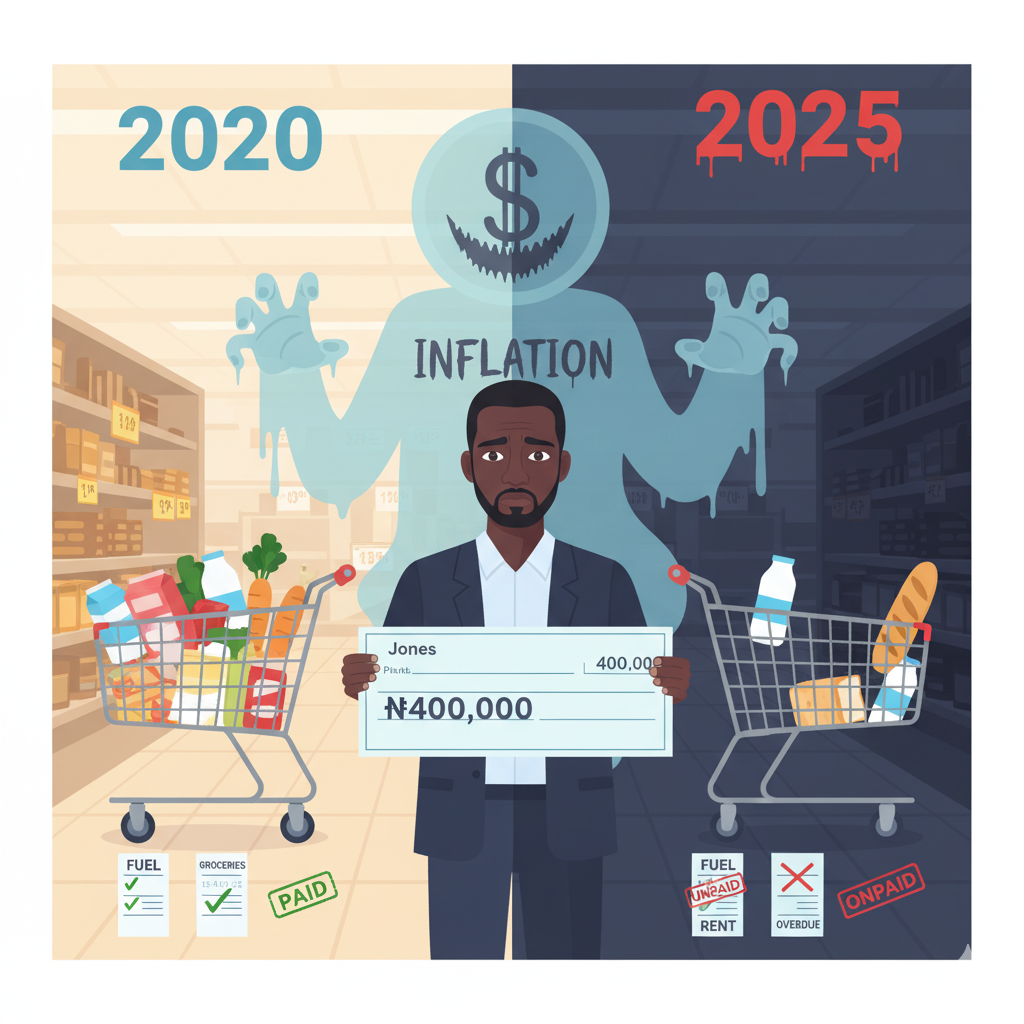Have you ever gone to the market with ₦10,000, only to return with half of what you could buy a year ago? This is a clear example of how inflation affects Nigerians. You are not imagining things – your money is losing its value over time. That slow, silent erosion is called inflation, the invisible thief impacting Nigerians every single day.

In this post, we’ll unpack what inflation really means, how it affects your daily life, why your salary “feels smaller,” and what you can start doing about it.
What Is Inflation? (A Simple Definition)
Let’s keep it simple.
Inflation is when prices of goods and services rise over time, reducing the amount of things your money can buy.
In other words, the value of money is falling — not because the naira notes in your hand have physically changed, but because the purchasing power of those notes has reduced.
For example, if ₦1,000 could buy you a full tub of garri last year but can only buy half today, that’s inflation in action. It’s not your fault. It’s just how money behaves when prices keep going up across the economy.
Why Inflation Matters to You, Today
Inflation isn’t just an economic term for experts and policymakers — it’s personal. You feel it every time you step out to buy something.
Last year, a 500g tin of Milo sold for around ₦1,500. Today, it’s hovering around ₦2,800 in some supermarkets. A bag of garri that cost ₦1,200 now sells for over ₦2,000. Even transport fares — once ₦200 for a short drop — now go for ₦500 or more, depending on the city.

You don’t need a PhD in Economics to see what’s happening. Everything is getting more expensive, but your income is likely staying the same. That’s the real pain point of inflation — your lifestyle doesn’t change, but your money buys less.
How Inflation Shows Up in Nigeria Right Now
As of late 2025, Nigeria’s inflation rate remains one of the highest in Africa, hovering above 27%, according to the National Bureau of Statistics (NBS).
Food inflation — the one that hits us hardest — sits even higher, over 31%. That’s why your weekly market budget never seems to stretch far enough.

Fuel prices have more than doubled since subsidy removal, and transport fares followed suit. Landlords have raised rent “because everything has gone up.” The naira has also lost value against the dollar, meaning imported goods (and even locally made products that rely on imported materials) are now more expensive.
So when people say, “things are hard,” they’re really talking about the impact of inflation.
If the prices of what you buy every week are rising faster than your income, your real value of money is shrinking.
Example snapshot:
| Item | Price (2019) | Average Price (2025) | % Increase |
| Bag of rice (50kg) | ₦15,000 | ₦65,000 | +333% |
| 12.5kg Cooking gas | ₦3,500 | ₦14,000 | +300% |
| Tin of Milo (500g) | ₦1,500 | ₦2,800 | +87% |
| Petrol (per litre) | ₦145 | ₦900 | +521% |
That’s inflation in motion — it eats gradually, then suddenly.
How Economists Measure Inflation
Economists track inflation using the Consumer Price Index (CPI) — a fancy term for the average change in prices of common goods and services that households buy.
In plain English, they look at a “basket” of everyday items — food, housing, transport, clothing, healthcare, etc. — and compare how the prices change over time.
- Headline inflation includes everything (even volatile prices like food and fuel).
- Core inflation excludes those volatile items to show the underlying trend.
You don’t need to memorize these terms. Just remember this: if the prices of what you buy every week are rising faster than your income, your real value of money is shrinking.
Why Your Salary Feels Smaller Even When It Didn’t Change
Ever wondered why your ₦400,000 salary in 2020 used to feel “plenty,” but now disappears before the month ends?
That’s inflation at work again.

Your salary hasn’t really changed — only its purchasing power has. What we call nominal income (the number you’re paid) stays the same, but your real income (what that number can buy) drops.
Let’s illustrate:
In 2020, ₦400,000 could buy groceries, fuel, rent, and still leave you with savings.
In 2025, with a 27% inflation rate, that same ₦400,000 now buys the equivalent of ₦292,000 worth of goods.
So, you’re technically earning the same amount, but living poorer. This is why many Nigerians feel like they’re running harder but not moving forward. It’s not laziness — it’s the invisible thief.
FINTEL Action Step: How to Regain Awareness
Before you can fight inflation, you must first see where your money is going.
Start by tracking your daily expenses — no matter how small. This simple habit builds financial awareness and gives you real data on your spending patterns.
You can use a notebook, a mobile app like Money Manager, or our free FINTEL Expense Tracking Template (available to community members only).
In our FINTEL Warriors community, we’ve launched a Track Your Expenses Challenge — a practical exercise where members record what they spend daily for eight weeks. The goal? To uncover leaks, patterns, and habits that inflation hides in plain sight.
If you’d like to join us, click Join the Challenge.
Because the truth is, you can’t control what you don’t measure.
The Bottom Line
Inflation isn’t just a government statistic. It’s that extra ₦200 on your bus fare, the new price tag on your child’s cereal, or the sudden jump in your data subscription.
You can’t stop it entirely — but you can understand it, plan around it, and make smarter financial choices because of it.
In the next part of this 3-part series, we’ll talk about how inflation affects your savings, investments, and long-term goals, and what you can do to protect yourself.
For now, take the first step — start tracking your expenses.
Remember that awareness is the foundation of every financial breakthrough.

Pingback: Who Gains and Who Loses from Inflation in Nigeria - FintelCoach
Pingback: How to Beat Inflation in Nigeria: Smart Money Moves for 2025 - FintelCoach
Pingback: How to Build Multiple Streams of Income: The Complete Beginner's Guide - FintelCoach